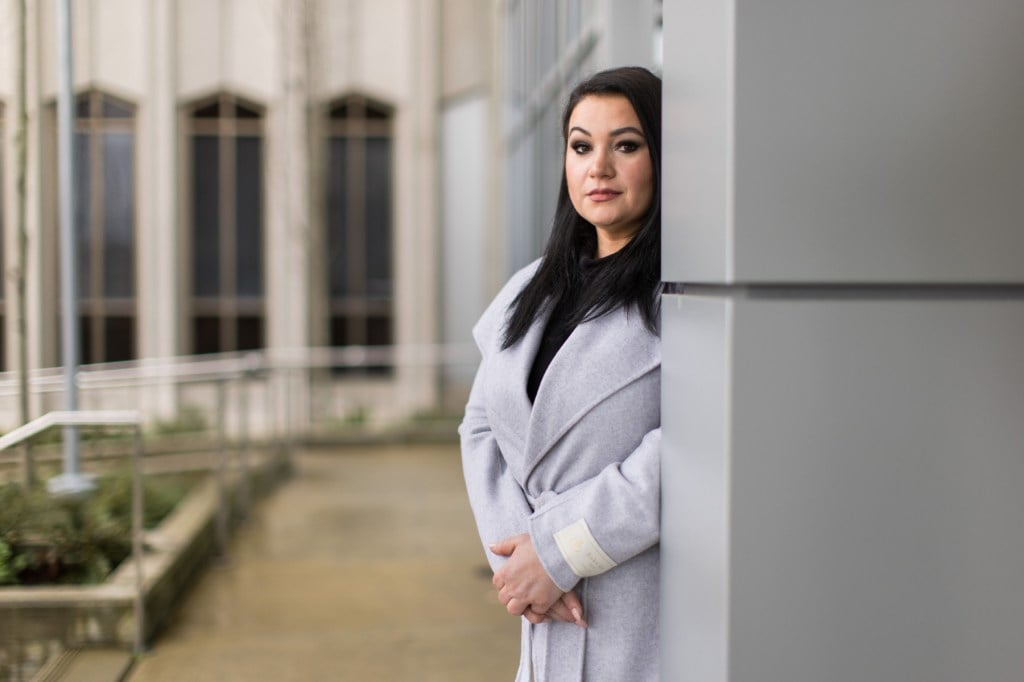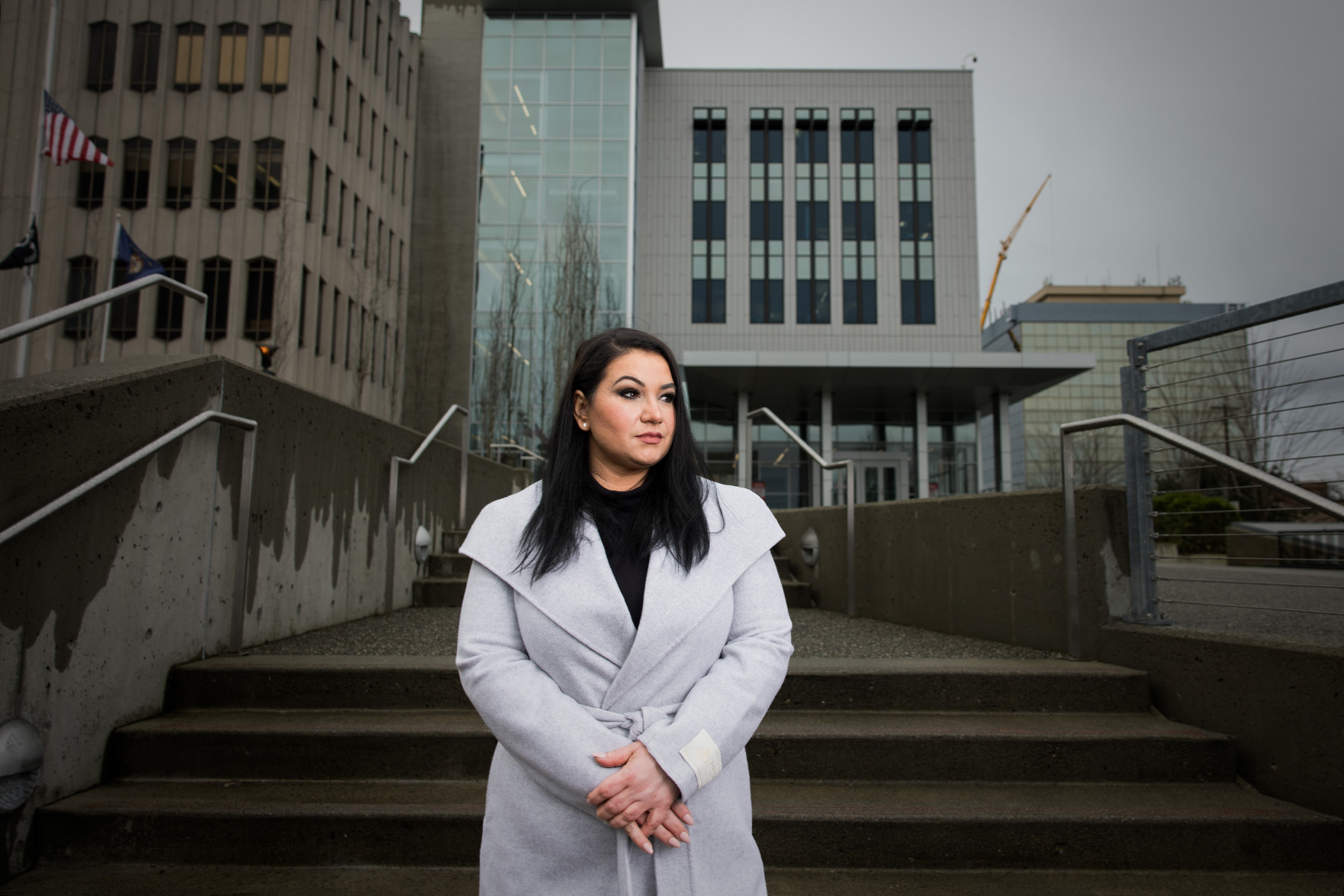For a long time, the justice system in Snohomish County believed Gina Bloom.
When she told police in February 2020 that her then-husband, Brian Yorks, had assaulted her, they arrested him for second-degree rape. When she reported that he would control and intimidate her, the Snohomish County Superior Court granted her a protection order. And when Yorks filed for divorce following her rape accusation, a court commissioner gave her temporary custody of their 4- and 6-year-old sons.
Then, in September 2020, Yorks asked for a guardian ad litem, a neutral person appointed by the court to represent the best interest of the children. He wanted the guardian ad litem, commonly referred to as a GAL, to look into Bloom’s abuse allegations, which he categorically denied. Yorks’ attorney with Canfield Madow Law Group, a family law firm north of Seattle, suggested a local family law attorney named Brian Parker, emails show.
Bloom told her attorney she didn’t want Parker, who, like many guardians ad litem, claims no professional expertise in mental health. She had a hunch that she couldn’t trust him, she said to InvestigateWest. But when Bloom’s preferred choice for a guardian ad litem was unavailable, she felt like she had no choice but to allow him to step in.
That, Bloom said, is when everything changed.
Over the course of five reports to the court in five months, Parker slowly built a narrative convincing local judges that it was Bloom, not Yorks, who was the more dangerous abuser — a label that would impact her far beyond family court, she alleged in a lawsuit filed against Parker and Yorks’ attorney in January.
Despite Parker’s admitted lack of training or qualifications on diagnosing mental illness, his reports depicting Bloom as mentally unstable held considerable influence in court. The more Bloom pushed back, questioning the chummy relationship that she perceived between Parker and her ex’s attorneys, the more Parker attacked her credibility, a thorough review of Parker’s reports and other court records shows.
“It’s one of those things that you’re like, ‘This is not happening. It’s not real.’ It made me feel the same way as when my ex would abuse me,” Bloom said. “You’re silenced for 12 years in this marriage, and then when you finally find your voice, they use it against you.”
Canfield Madow Law Group declined to discuss the case with InvestigateWest. Yorks’ attorney advised Yorks not to discuss the case with reporters either. Parker didn’t respond to multiple phone and email requests for comment sent to him through the Clallam County Superior Court administrator, who confirmed Parker had received the messages.
Bloom’s case reveals the uncommon influence courts entrust to guardians ad litem like Parker — an influence that experts say commonly results in mothers like Bloom losing their kids to their abusers. A nationwide analysis of over 2,700 family court cases from 2005 to 2014 found that when mothers make claims of abuse, they lose custody a quarter of the time. Adding a guardian ad litem to the case raises that risk to 36% on average, the researchers found. The analysis also shows that when fathers make claims of abuse, in contrast, guardians ad litem have no statistically significant effect on fathers’ rates of custody losses.
In many Washington jurisdictions, like in other states, guardians ad litem aren’t required to have any kind of professional license. Many are attorneys or social workers whose training entails a four-day certification program developed by the state. Although a model code developed by the National Council of Juvenile and Family Court Judges suggests that guardians ad litem assigned to cases involving domestic abuse allegations should be licensed mental health professionals, no states have codified that requirement in state law.
“They’re given far too much authority by the court, in my mind,” said Tracee Parker, a licensed psychologist and domestic violence expert in King County who provides training to family law professionals in Washington (no relation to Brian Parker). “I see survivors scrutinized at an incredible level. All of a sudden, they become the focus of the court rather than the abuse.”
Despite medical records, declarations from neighbors and a psychologist asserting that Bloom was mentally stable and a responsible parent, Parker’s five reports continually questioned her motivations for accusing Yorks of abuse and criticized her refusal to cooperate with Yorks. At the end of the custody trial in 2022, the court confirmed that Yorks had committed domestic violence against Bloom — but by that point the finding didn’t make a difference for her.
The hits to her credibility seeped into every facet of Bloom’s life. By the end of the family law case, she lost her home, her savings, and her court-ordered protection from her abuser.
And eventually, she lost custody of her kids. Just as Parker suggested.
Parker’s verdict
Bloom arrived at Parker’s law office in Everett, 30 miles north of Seattle, on a Friday afternoon in May 2021 with two rambunctious boys and a feeling that the interview would go poorly. She’d asked Parker to meet at her house just a few miles away in Lake Stevens, a town of about 40,000 people where her sons were born and raised, to make the interview less stressful for the kids. But Parker wasn’t conducting home visits due to the COVID-19 pandemic. She’d asked to stay in the room while he met with them. Parker said he had to talk to them alone.
When they went inside, her sons screamed and ran through Parker’s office, pushing past her to try to get out the door. The visit lasted less than an hour.
Bloom had her own separate email conversations and interview with Parker a few months before. It was in these conversations that she had to make a difficult choice: Whether or not she should say if she thought her then-husband — a man she was trying to escape — was dangerous to the children.
She told Parker no, she didn’t have concerns about Yorks abusing the kids. She still wanted him in their lives. “But supervised, for now,” she emailed Parker in February 2021. “There are safety and neglect concerns.”
She forwarded Parker information from the Snohomish County Prosecutor’s Office saying that Yorks’ 2020 rape case was still under review. Parker read the allegation that Bloom made to Lake Stevens police, which described how one night, after taking prescription painkillers and falling sleep, she woke up to Yorks raping her.
This wasn’t the first time he’d assaulted her, Bloom told detectives. In an interview with police following her rape accusation, Bloom said she’d been trying to separate from Yorks for a few years, but he would keep her from leaving by taking her car keys. She said that he wouldn’t give her access to the family bank accounts, bills or even the mailbox. During arguments, he would intimidate her with his gun and threaten to deport Bloom, a Romanian immigrant. She feared he was tracking her, since he would often check on her at work and other places without warning, to the alarm of her friends and coworkers. The day after the interview, police arrested Yorks for second-degree rape and confiscated his gun, according to the police report.
Bloom gave Parker this information, in addition to photos of scratches and marks on her son after he came back from an unsupervised visit with his dad. Parker reviewed several sworn declarations submitted by neighbors that claimed Yorks would let his kids roam the neighborhood late at night, play in the road and knock on neighbors’ doors asking for food. Meanwhile, neighbors described Bloom as a “loving” and “amazing” mom who did a good job supervising her kids.
But when Parker filed his first report in June 2021, he focused on Bloom’s brief office visit with her sons.
“While there are grave concerns about Father’s parenting, there are also grave concerns about Mother. She has not displayed any effective techniques for redirecting the children when they are misbehaving, or addressing their bad behavior,” the report said.
Parker also wrote in his report that Bloom had likely coached the children on what to say. When Bloom’s youngest had calmed down enough to talk to Parker during the interview, the child had said things like, “I love my mom more,” and “I want to live with my mom.” Parker accused Bloom of parental alienation, a disputed psychological theory that describes a parent making false claims of abuse or manipulating their child into turning against the other parent. Parker recommended that Bloom, not Yorks, get a psychological evaluation, despite also acknowledging Yorks’ history of domestic violence that the court had found credible.
Parker concluded that Yorks should be given unsupervised visits during the week. Bloom’s position that she didn’t view Yorks as a danger to the children was a “huge factor” in that recommendation, he later told the court.
The court adopted Parker’s recommendations. Court Commissioner Patricia Nelson ordered Bloom to complete a psychological evaluation.
Grave concerns
In July 2021, Bloom’s kids came back from their first weekend with their dad in over a year. One of her sons had bruises on his hips and was acting withdrawn, according to medical records. Her son’s comments led Bloom to fear he was experiencing sexual abuse while with his dad, she said. She emailed Parker to say she refused to send her kids back to their father, adding that her son was inconsolable at night and would wake up screaming.
“WE SHOULD ALL BE GRAVELY CONCERNED,” she emailed Parker. “I WILL NOT RELEASE THE CHILDREN TODAY.”
Lake Stevens police and Child Protective Services investigated. Both agencies found “nothing criminally occurred.”
Bloom’s concerns with child sexual abuse were portrayed by Yorks’ attorney, Damon Canfield, as a manipulation intended to win more parenting time, using Parker’s report as evidence.
“This is just the latest, and most outrageous, accusation Gina has made for purposes of frustrating residential time,” Canfield emailed Parker. “It is pretty obvious from the GAL report and this ongoing pattern of behavior that Gina is destroying these little boys and shows no meaningful ability to parent them.”
Parker filed a second report to the court the next month. He noted that there were indications that the father was engaging in inappropriate physical discipline of the children, as documented by photographs and reports of bruises. He also recommended that the children get a forensic interview by a trained sexual abuse investigator, adding that he does “not take allegations of sex abuse lightly.” (When the children finally did a forensic interview over a year later, they didn’t disclose any sexual abuse.) But the majority of Parker’s report focused on Bloom’s credibility. He went after the timing of Bloom’s claims, calling them “highly suspicious.”
“I suspect, but cannot prove, they are manufactured to gain an advantage in litigation,” Parker wrote.
A section of his report titled “Concerns for mother’s mental health” included a bulleted list of Bloom’s behaviors that he’d observed, including a lack of remorse and empathy, attention-seeking behavior and avoiding taking any responsibility for problems in her life. Noting the “important caveat” that he is not a mental health professional and has no training on diagnosing mental illness, he nevertheless reported that Bloom’s behavior “leads to strong concerns she has a personality disorder or other mental illness.” Bloom has never been diagnosed with a personality disorder, her medical records show.
In conclusion, he recommended that Yorks continue to have unsupervised visits. And he provided a warning for Bloom: “If Mother continues her alienating behavior, I am very likely to recommend Father be given primary custody of the children.”

Conflicts of interest
As the custody case dragged on, Bloom said she became more alarmed by the close relationship she perceived between Parker and Yorks’ attorneys with Canfield Madow Law Group.
She found that of Parker’s fewer than 100 friends on Facebook, two Canfield Madow attorneys were among them. She noted that Parker and Canfield would typically walk into the courtroom together. And she believed they were communicating privately, she said, pointing to emails where they scheduled a phone call about her case that never appeared in Parker’s billing statements.
Although it’s not uncommon for guardians ad litem and parties’ lawyers to know each other, especially in smaller communities, those relationships can bring out biases. Part of the problem lies with how private guardians ad litem are chosen and paid, family law attorneys and advocates say.
In Washington and throughout the nation, they are typically requested by lawyers. Oftentimes, both sides propose specific guardians ad litem, and the court assigns the one that both parties agree on or whichever is available first. Attorneys can therefore push for guardians ad litem who they believe will favor their client — for example, some are more inclined to recommend 50/50 parenting plans, while some have better understandings of domestic abuse than others.
This system puts survivors at a disadvantage if they can’t afford a lawyer and their abuser can, domestic violence advocates say. It also creates incentives for guardians ad litem to favor certain parties, since those attorneys might suggest them again for future cases.
“It’s a mutually beneficial relationship,” said Joan Meier, director of the National Family Violence Law Center at the George Washington University Law School who led the national study on child custody outcomes. “The lawyer recruits the GAL. The GAL refers people to the lawyer. I mean, there’s a ton of financial incentivization that goes on with those relationships, and that biases what people do.”
Parker was assigned as a guardian ad litem to at least 12 cases in Snohomish County between 2019 and 2024, according to court records. Eight of those 12 cases involved a Canfield Madow attorney. Several involved allegations that one parent was coaching the children or making claims of abuse without evidence.
Though Congress passed legislation encouraging states to strengthen training requirements for guardians ad litem, few states have done so. Known as “Kayden’s Law,” a section of the 2022 reauthorization of the Violence Against Women Act gives federal funding to states that adopt certain safeguards preventing dangerous parents from gaining custody, including training for guardians ad litem. The legislation was inspired by a custody case in Pennsylvania in which a judge granted a father, Jeffrey Mancuso, unsupervised visits despite the mother’s desperate warnings that he was violent. During a court-ordered visit in 2018, Mancuso murdered his 7-year-old daughter, Kayden, before also killing himself.
So far, eight states have adopted versions of Kayden’s Law. A version introduced in the Washington Legislature last year died in committee.
Guardians ad litem also charge steep fees for their services. In Bloom’s case, Yorks agreed to pay all of Parker’s fees, subject to later reallocation, because Bloom couldn’t afford it. She’d depended on Yorks’ income throughout their marriage. Her part-time work as a cosmetics vendor didn’t cover the tens of thousands of dollars she would need for her years-long custody case.
Parker’s bill ultimately reached $25,000. One domestic violence advocate said she’s seen such bills in Washington as high as $100,000 for a single case. While some attorneys and experts say that they don’t see guardian ad litem investigations being impacted by who foots the bill, others argue that it creates another layer of bias.
“We should never have one party paying just because they’re the ones with the money, because that is intrinsically going to bias the appointed person. There’s just no way around that,” Meier said. “They can claim that they’re not influenced by that, but of course they are.”
Some family law experts say that removing some of these private financial incentives could help reduce conflicts of interest, whether perceived or real. In King County, a court program called Family Court Services employs social workers to conduct parenting evaluations for family law cases. The evaluation fees are on a sliding scale and are capped at $2,000 per parent.
“If every county could afford to have family court services and have people who are highly trained in (domestic violence) do evaluations, then there would be less need to ask this question about, ‘Are GALs biased?’” King County Superior Court Judge Janet Helson said. “A lot of it has to do with resources and us collectively deciding that we care enough to fund the services we need to ensure that children are safe.”
Denied and dismissed
In October 2021, Bloom went to court to renew her domestic violence protection order against Yorks. The order, which kept Yorks from contacting her and the kids outside of the parenting plan, was separate from the custody case.
As she sat in the courtroom, she remembers spotting Yorks and Canfield sitting across the aisle. Then Parker walked through the door.
“It was a shock to see him there,” Bloom said. “He wasn’t part of anything that had to do with the (protection order).”
Bloom watched as he took a seat by her ex and his attorney, she said. Parker told the court commissioner that if the protection order were renewed, it should clearly express that Yorks is allowed to pick the children up from school — an issue that had been causing conflict between Yorks and Bloom.
Commissioner Nelson, who had ordered Bloom to complete a psychological evaluation, acknowledged that she’d read Parker’s report. Nelson not only denied the order’s renewal, she dismissed it entirely, two months before it was set to expire.
On the same day that her protection order was dismissed, Parker observed Yorks with the kids for the first time, more than four months after he observed Bloom with them. Unlike with Bloom, Parker said he allowed Yorks to be in the room for the interview. Parker noted that the kids were unruly, but “were (mostly) compliant” with Yorks’ instructions and behaved better than they had with their mom.
Bloom emailed the Washington State Bar Association the next day and asked them to hold Parker accountable for the protection order dismissal. Without the order, she feared that Yorks would get his gun back from the Lake Stevens Police Department. “That is the gun that I will be killed with,” she wrote in the email, adding that Yorks might kill her and make it look like a suicide.
Two weeks later, when her son started talking about knives — following a different incident where her son told his dad that he would take a knife and stab himself if he had to spend nine nights with him — Bloom panicked. “The children are at risk!!!!!” she emailed Parker, copying the state’s bar association and attorney general’s office. “It is your fault and your fault alone that these children are unsupervised during visitation with their father. If something happens to these children, I will make sure you never practice law again.”
In response, Parker wrote in his fourth report that Bloom’s tone had grown “increasingly savage, filled with threats against my license and blaming me for all of the children’s problems.”
Parker recommended in that report that the kids live primarily with Yorks, based on Bloom’s refusal to cooperatively coparent, as well as Yorks’ “superior ability to redirect the children.” He also criticized Bloom for “increasingly dwelling on violent outcomes” — referring to her emails to Parker and the bar association saying that she feared Yorks would kill her and her children.
Yorks and his attorney requested not only an immediate change in custody, but a restraining order against Bloom to keep her away from the kids. There was now a “clearly demented level of conflict and allegations” made by Bloom, Yorks wrote in his motion to the court. He attached a copy of the latest guardian ad litem report, which, Yorks noted, recommends a change in custody “based upon Gina’s recent escalation in rage.”
“This is not logical behavior, and I am extremely concerned for the children’s safety in Gina’s care,” Yorks wrote.
He asked that the children be put in his care until the next hearing and that Bloom’s visits be professionally supervised. The court granted the order.
Bloom tried to remove Parker from the case that November, claiming that he’d pressured her to cooperate with her abuser instead of stopping the abuse. Parker wrote that her motion to discharge him was full of blatantly false statements “intended to harm my reputation or credibility.” Bloom’s motion was denied.
In February 2022, two years after she’d reported Yorks for raping her, the Snohomish County Prosecutor’s Office decided not to bring criminal charges. A major reason: Parker’s reports.
“The victim currently has lost custody of her children based upon guardian ad litem reports which document possible mental health concerns and issues that raise concern related to the victim’s credibility,” the prosecutor wrote.

Judgments and misjudgments
As Bloom sent long emails to Parker and Canfield accusing them of misconduct, Parker would reply asking about the status of her court-ordered psychological evaluation.
Bloom’s evaluation was finally sent to the court a few months before the custody case went to trial. A licensed clinical psychologist had administered assessments, conducted interviews and reviewed more than 100 documents provided by Bloom and Yorks. Her evaluation found no indications that Bloom had a personality disorder. Bloom’s providers had no concerns about her mental stability. “It is clear that Gina has strong parenting skills,” the psychologist wrote.
Though the evaluation acknowledged that Bloom “appears to exaggerate” when she felt unheard, it concluded: “No evidence was provided to suggest that Gina’s reactions are malicious in intent rather than overly emotionally reactive behaviors coming from a position of feeling powerless.”
The allegations that Bloom was coaching the children were also unlikely, according to the evaluation. And it concluded that there wasn’t enough evidence to determine whether Bloom was falsely alleging child abuse to gain an upper hand in the custody case. Although it was possible that Bloom was lying about it, she likely would’ve also lied in her psychological testing to paint a more positive picture of herself — which she didn’t, the test showed. “It is not uncommon for victims of IPV [intimate partner violence] and those who suffer from PTSD to become hypervigilant in their attempts to protect their children and over-interpret benign injuries and behaviors,” the evaluation said.
Yet when the case went to trial in spring of 2022, Parker repeatedly mentioned his concerns with Bloom’s mental health.
“I do want to stress, I have no training in psychology. I don’t diagnose people. But,” Parker testified, “I saw certain behaviors that my readings indicate were consistent with, perhaps, a personality disorder.”
He focused on one sentence in the 54-page evaluation: “There is no doubt that Gina needs to learn more effective ways of handling herself and, neglecting to do so, could impact her parenting and the children’s well-being.”
“This is very indicative of the behavior I’ve seen,” Parker said to the court.
After several days of listening to testimony, Snohomish County Superior Court Judge Paul Thompson ruled in July 2022 that Yorks would get custody of the kids. Thompson noted there were “long-term emotional issues” that “absolutely interfere with her ability to parent these children.” Thompson didn’t reply to InvestigateWest’s emails and phone calls to his law clerk requesting an interview.
Thompson also recognized that Yorks had committed acts of domestic violence against Bloom. “Clearly, those were established,” he said in his oral decision. But despite a state law that requires a parent’s time with their children to be limited if there’s a history of domestic violence, Thompson found “no mandatory reasons to put any limitations on a parent.”
Bloom also had to give her ex-husband access to her medical and therapy progress. If she filed a domestic violence protection order, police report or CPS report that was determined to be unfounded, she could lose time with her kids, who she could only see every other weekend. And the court awarded their house to Yorks in the divorce, giving her just one month to move out.
“I was basically booted out of the house without any money,” Bloom said. “I had to sign a release of information so that my abuser can speak to my trauma therapist. I felt so naked and exposed.”
Bloom’s attorney argued to Thompson that there were legal problems with the parenting plan. Thompson said they could file a motion to reconsider if they thought there was an error. When Bloom did so a few days later, Thompson denied the motion in its entirety.
Bloom decided to appeal with the help of the Family Violence Appellate Project, a nonprofit that provided free legal services to domestic violence survivors in Washington until it closed in January due to a lack of funding. She knew it was a gamble — the appeals process is long and expensive, and only a small fraction are successful.
But in February 2024, the Washington Court of Appeals agreed with Bloom that Thompson had made a mistake when he gave Yorks the majority of residential time without making required findings that the kids would be safe with him or that his history of domestic violence didn’t impact them. It also found that the parenting plan’s restrictions on filing CPS and law enforcement reports were an unconstitutional restraint on Bloom’s right to free speech.
The appeal hasn’t meant much for Bloom yet. Her case now has to go back to the trial court. In the meantime, she’s continued to file complaints against those involved in her case.
In late December, she filed a federal lawsuit against the State of Washington, Snohomish County, the Snohomish County Superior Court, Thompson and other judicial officers arguing that her First, Fourth, Fifth and Fourteenth Amendment rights were violated throughout her case. In January, she filed a complaint for damages against Parker and Canfield in Clallam County Superior Court, where Parker was sworn in as the county’s new family law court commissioner in January. She alleged that she suffered “needless injuries and emotional distress” as a direct result of Parker’s and Canfield’s “collusion” in her family court case.
As she keeps fighting the parenting plan, she’s drained her bank account paying for legal fees, on top of spending thousands of dollars on professionally supervised visits with her kids. She feels like the custody battle has become a means for her ex to continue exerting control over her even after their divorce.
“I need to be bankrupt and homeless, and that is the goal in cases like this,” Bloom said. “The goal is to make sure that the other party has no means of coming to court, being represented, reporting anything. It’s just part of the post-separation abuse.”
‘The guardian ad litem said’
A few days before Christmas in 2023, Bloom answered a knock on her apartment door. Dressed in a pink bathrobe, her face red from crying, she nervously greeted two Kirkland police officers. The officers had come to check on her after her legal adviser, who was assisting Bloom in her family law case when she couldn’t afford an attorney, called 911 worried about her safety, according to the police report.
Bloom welcomed them inside and apologized for the mess. She was in the process of moving, she said. She’d moved a few times since Thompson ruled that she had a month to be out of her house, first couchsurfing with a friend before finding housing through a domestic violence nonprofit.
She nodded toward a piece of paper on her table. It had a message in typed, capital letters.
YOU DON’T DESERVE TO LIVE
YOU ARE BETTER DEAD!
She told the officers that she believed it had been mailed by her ex-husband. The message was made with a label maker, similar to the labels that Yorks would make during their marriage, according to photos and court records reviewed by InvestigateWest. And the street address that the note had been mailed to was wrong. Yorks, who had remarried, had given that same incorrect address to the court to serve her with a protection order a few months before, court records show.
“I lived under address confidentiality. Nobody knew where I lived,” Bloom said. “He found out. He must have followed me.”
It was the latest in a series of unnerving interactions. Earlier that year, she’d found a handwritten letter on her windshield that said “dead” with a smiley face, she said. She’d also gotten a jewelry box with a pair of hoop earrings inside, along with a note — typed with a label maker — that said, “Kill Yourself.” Both notes were turned into the police.
Yorks denied sending any of the notes or letters, and told police that Bloom had a history of false reporting, which the Lake Stevens Police Department relayed to the Kirkland detective, according to the police report. Kirkland police concluded that probable cause couldn’t be developed.
Bloom, having lost faith in the justice system, said she went into hiding for a few months and legally changed her name.
“Knowing that if something were to happen and I’m not believed, I was like, ‘I need to go somewhere where they cannot find me.’ And I did. I went in the middle of nowhere,” Bloom said. “And I stayed there for six months.”
There was a time, before Parker’s reports, when the police believed her. In 2016, eight years into their nearly 12-year marriage, Lake Stevens police arrived at her door and found Bloom with a baby in her arms and tears in her eyes. She told them how her husband had burst through their locked bathroom door during an argument and taken her phone. Bloom showed the officers the broken lock. They arrested him for interfering with reporting domestic violence.
But by July 2021, when she told Lake Stevens police that her son was refusing to get out of her car for a visit with his dad, the department had grown skeptical of her calls. “Even the guardian ad litem said there was strong evidence of her coaching the boys when she brought them in,” Yorks said to an officer as he waited for the kids to get out of Bloom’s car, according to a video that Yorks took and later sent to Parker.
“I have no doubt,” the officer replied. The police left after talking to Bloom, and no further action was taken.
In January 2024, Lake Stevens police were back at Yorks’ house. Another woman had called 911 after an argument with her husband. She opened the door with a baby in her arms and told the officer that she was afraid to stay in the home with him. She was also worried that he was tracking her phone.
“And what’s your husband’s name?” the officer asked.
She wrote it down in a notepad and handed it to him.
“Oh, Brian Yorks?” the officer said. “I think I actually know who he is.”
InvestigateWest (investigatewest.org) is an independent news nonprofit dedicated to investigative journalism in the Pacific Northwest. Reporter Kelsey Turner can be reached at [email protected].




